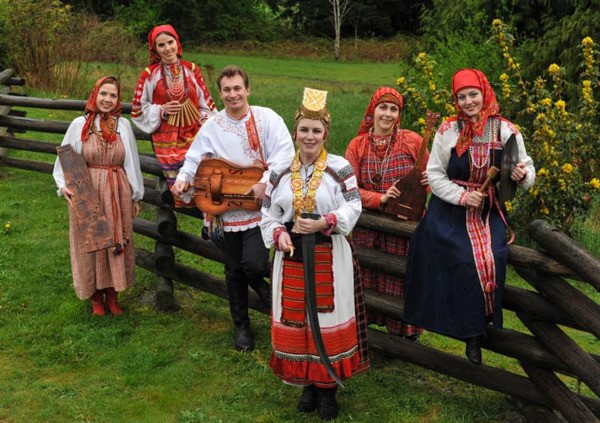While youngsters on Whidbey anxiously await the arrival of rotund and jovial Santa Claus, children in Russia are anticipating the arrival of comparably slim-figured Father Frost, known as Ded Moroz and his granddaughter, Snegurochka.
The Northwest Language Academy and Cultural Center is presenting the next installation in its Language of Food series: Yolka, a family-friendly celebration of Russian food, culture and holiday festivities on Saturday, Dec. 6. According to event coordinators, it is rumored that Ded Moroz and his companion may stop by for a visit.
In Russian, Yolka refers to a Christmas tree, according to Northwest Language and Cultural Center faculty member Masha Ellis, who immigrated to the United States from Moscow.
“The flavor of this day will be an Advent, Christmas celebration,” she said.
Although Russia is predominantly a Christian Orthodox country, the cultural center’s Yolka festivities will be secular and focused upon general folk traditions. In Orthodox tradition, Christmas is celebrated on Jan. 7, after the New Year. Since the fall of the Soviet Union, many non-Orthodox Russians have begun celebrating Christmas on Dec. 25. Dec. 6 is also significant, the date celebrating patron saint of Russia, Saint Nicholas, who Ellis explained is also the prototype for Ded Moroz.
While Ellis grew up in Soviet Russia, during a time in which many cultural and religious celebrations were not allowed, she said she still remembered distinctly the scent of the decorative New Year trees, today known again as Yolka.
“I was born in the Soviet Union, so we didn’t celebrate Christmas,” said Ellis. “But my dad would bring in a New Year tree from outside … I remember the fragrance would fill the whole room.”
“We focus on the human aspect,” said Josette Hendrix, founder and director of the cultural center, explaining that the center aims for its festivities and lessons to reach beyond boundaries such as politics or religion.
Hendrix said that the Language of Food series came about from a realization that, while many individuals are eager to learn about other cultures, they may find a language course intimidating.
“They may not feel that it is possible to learn a new language or travel but they find value in experiencing other cultures through sharing food and getting together as a community,” said Hendrix.
Hendrix added that, since its inception 15 years ago, the series evolved to include music, dance and other facets, explaining that these aspects of community gatherings happen organically.
“We’ve experienced over and over again — it happens almost magically — there is something unique that gets transmitted by this coming together,” said Hendrix. “When we prepare food together, there is a natural opportunity for stories to be shared.”
Hendrix continued by saying that people often share stories about the origin of recipes, or the manner in which their grandparents or ancestors once prepared the same dishes.
“It unfolds the story of those people, of that place on the earth, of that time in history,” she said. “It is really pretty profound.”
The festival takes place from 5:30 to 9 p.m., beginning with a holiday bazaar and social hour during which kvass — a non-alcoholic fermented beverage made from rye bread — and vodka will be served. The bazaar will be complete with traditional gifts which Ellis recently brought back to the states after a trip to Russia. Ornaments, matryoshka dolls and dolls dressed in national costumes and traditional Khokhloma crafts will be available for purchase. According to Artrusse.ca, Khokhloma is an artistic painting style which originated in the Trans-Volga region; it received its moniker from the village in which it is believed the art was practiced in ancient times. Khokhloma is known for vivid flower patterns and red and gold colors applied to a black background. There will also be watercolor paintings, which Ellis said are presently quite popular in Moscow.
The traditional buffet will be prepared by a Russian family.
Ellis explained that there will be plenty of food and beverage options for those who, in accordance with Russian Orthodox tradition, are observing a pre-Christmas fasting period during Advent.
A team of Russian cooks will share their stories and culture through a cooking class — a stand-alone event — preceding the festival from 2 to 5 p.m. Many of the foods produced in the class will also be incorporated into the feast later in the evening. The cost for the class is $35.
Ethnomusicology group Juliana and PAVA will perform traditional songs and children of the Kovalsky Youth Group will perform a Vertep — a word which means cave in Ukrainian. The Vertep is a pageant which depicts the nativity scene and other mystery plays. The Kovalsky Youth Group will also be singing Russian, Polish and Ukrainian winter carols.
“Through that performance, children will show (without making a big deal of it) that these are basically the same traditions,” said Ellis. “These people did coexist for centuries.”
“This whole event is an opportunity for families and community members to come together and celebrate the coming of the holidays from a new perspective,” said Hendrix.
Admission to the Yolka is $65. Overnight accommodations are available at the Northwest Language and Cultural Center guest house.
For more information, visit nwlanguageacademy.com or call 360-321-2101.



